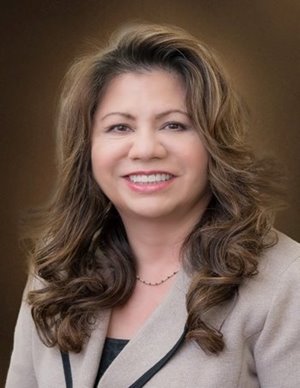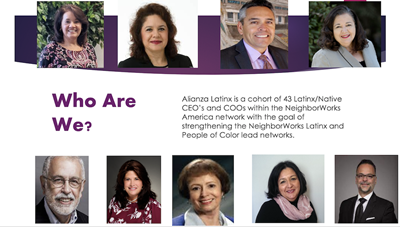"Alianza" means "alliance" in Spanish and it’s the name for a group of Latinx leaders and future leaders in the NeighborWorks network who meet to discuss issues that are important to all of them. They talk about challenges, says coordinator Maria Garciaz, CEO of NeighborWorks Salt Lake. And they talk about solutions.
 The group got its start in 2019 after Garciaz was invited to attend a meeting of Black network leaders. As explained to Garciaz by Lori Gay, CEO of Neighborhood Housing Services of Los Angeles, they gathered because, as leaders of color, it was important to support one another. Gay asked if Latinx leaders had plans for a similar group; that’s when the idea took root.
The group got its start in 2019 after Garciaz was invited to attend a meeting of Black network leaders. As explained to Garciaz by Lori Gay, CEO of Neighborhood Housing Services of Los Angeles, they gathered because, as leaders of color, it was important to support one another. Gay asked if Latinx leaders had plans for a similar group; that’s when the idea took root.
"As leaders of color, we face challenges in our own communities," Garciaz says. In some communities, the NeighborWorks network CEO might be the only leader of color among area nonprofits. "That’s certainly how it is for me in Salt Lake City," she adds.
Garciaz reached out to CEOs and executive directors of NeighborWorks network organizations from Arizona to Florida to Colorado to see if they’d be part of a planning committee. The group has been meeting ever since, and now has a membership of nearly four dozen NeighborWorks network leaders.
Garciaz has several recommendations for NeighborWorks network members looking to start an affiliate group. First, she says, "extend an invitation to gather and get to know each other. Share your story."
In building membership, it’s important to go beyond organization leaders, she advises. "Engage the next generation." Another recommendation? "Identify the intent and purpose of establishing your affiliate group." And don’t try to do everything at once, she adds.
Alianza began with a long list of items members wanted to address, but they have honed that list to priorities they deem most important. Mentorship is at the top. "A mentor/mentee relationship is important to us – coaching and identifying Latino and Latina leaders in the network who have been here fewer than five years, so they will stay longer," Garciaz says.
priorities they deem most important. Mentorship is at the top. "A mentor/mentee relationship is important to us – coaching and identifying Latino and Latina leaders in the network who have been here fewer than five years, so they will stay longer," Garciaz says.
Mentors also want to work with individuals who might be second or third in command – the leaders of tomorrow. "It’s important that we create opportunities for people in midlevel positions," says John Martinez, executive director of Centro Campesino. "We want to start preparing them for leadership."
Other priorities include:
- Diversity. Alianza members are reaching out to advisory committees to make sure there is a chance for Latinx representation. "Are there places where we need to be more ethnically represented? Let me know and I’ll get the word out," Garciaz says. Alianza also hopes to highlight the roles Latinx individuals play across the network, serving on national and state advisory committees, as members of boards of trustees, and as authors of scholarship and policy.
- Education. Sometimes, the alliance invites guest speakers to meetings, like a representative of the Federal Reserve Bank of San Francisco. And group members always ask questions of one another about best practices. Alianza members want to hear from their peers – not just Latinx peers, but other leaders of color in the network who can share behind-the-scenes information about programs (like Low Income Housing Institute’s tiny house villages) and policy (such as where leaders stand on remote work).
Jessica Padilla Gonzalez, executive director of Housing Partnership for Morris County, joined the group as soon as it started. "We go over our struggles," she says. "I find it so welcoming to be with people who have shared my same, lived experience. People who understand growing up in a Spanish-speaking household. It’s comforting. It’s nice to have mentors and women, especially Latina women, who understand where my questions are coming from."
Elizabeth Alonzo, executive director of NeighborWorks Laredo, says empowering each other is key, along with "bettering our communities in many ways such as housing, health, training, employment and many more services. As proud members of the NeighborWorks America membership, our contribution in bringing more services and opportunities to our Hispanic population is important."

